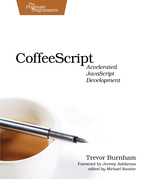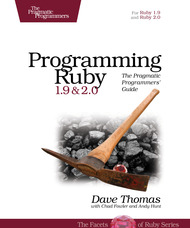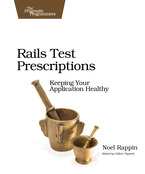Agile Web Development with Rails, Edition 4
8.2 Iteration C2: Add a Page Layout
7.3 Playtime
8.1 Iteration C1: Create the Catalog Listing
Show the model, view, and controller working together.
Create a second controller with a single index action
rails generate controller Store index create app/controllers/store_controller.rb
route get 'store/index'
invoke erb
create app/views/store
create app/views/store/index.html.erb
invoke test_unit
create test/controllers/store_controller_test.rb
invoke helper
create app/helpers/store_helper.rb
invoke test_unit
invoke assets
invoke coffee
create app/assets/javascripts/store.coffee
invoke scss
create app/assets/stylesheets/store.scss
Route the 'root' of the site to the store
edit config/routes.rb Rails.application.routes.draw do
get 'store/index'
resources :products
# The priority is based upon order of creation:
# first created -> highest priority.
# See how all your routes lay out with "rake routes".
# You can have the root of your site routed with "root"
root 'store#index', as: 'store'
# Example of regular route:
# get 'products/:id' => 'catalog#view'
# Example of named route that can be invoked with purchase_url(id: product.id)
# get 'products/:id/purchase' => 'catalog#purchase', as: :purchase
# Example resource route (maps HTTP verbs to controller actions automatically):
# resources :products
# Example resource route with options:
# resources :products do
# member do
# get 'short'
# post 'toggle'
# end
#
# collection do
# get 'sold'
# end
# end
# Example resource route with sub-resources:
# resources :products do
# resources :comments, :sales
# resource :seller
# end
# Example resource route with more complex sub-resources:
# resources :products do
# resources :comments
# resources :sales do
# get 'recent', on: :collection
# end
# end
# Example resource route with concerns:
# concern :toggleable do
# post 'toggle'
# end
# resources :posts, concerns: :toggleable
# resources :photos, concerns: :toggleable
# Example resource route within a namespace:
# namespace :admin do
# # Directs /admin/products/* to Admin::ProductsController
# # (app/controllers/admin/products_controller.rb)
# resources :products
# end
end
Demonstrate that everything is wired together
get /
Store#index
Find me in app/views/store/index.html.erb
In the controller, get a list of products from the model
edit app/controllers/store_controller.rb class StoreController < ApplicationController
def index
@products = Product.order(:title)
end
end
In the view, display a list of products
edit app/views/store/index.html.erb <p id="notice"><%= notice %></p>
<h1>Your Pragmatic Catalog</h1>
<% @products.each do |product| %>
<div class="entry">
<%= image_tag(product.image_url) %>
<h3><%= product.title %></h3>
<%= sanitize(product.description) %>
<div class="price_line">
<span class="price"><%= product.price %></span>
</div>
</div>
<% end %>
Add some basic style
edit app/assets/stylesheets/store.css.scss
.store {
h1 {
margin: 0;
padding-bottom: 0.5em;
font: 150% sans-serif;
color: #226;
border-bottom: 3px dotted #77d;
}
/* An entry in the store catalog */
.entry {
overflow: auto;
margin-top: 1em;
border-bottom: 1px dotted #77d;
min-height: 100px;
img {
width: 80px;
margin-right: 5px;
margin-bottom: 5px;
position: absolute;
}
h3 {
font-size: 120%;
font-family: sans-serif;
margin-left: 100px;
margin-top: 0;
margin-bottom: 2px;
color: #227;
}
p, div.price_line {
margin-left: 100px;
margin-top: 0.5em;
margin-bottom: 0.8em;
}
.price {
color: #44a;
font-weight: bold;
margin-right: 3em;
}
}
}
Show our first (ugly) catalog page
get /
Your Pragmatic Catalog
CoffeeScript
CoffeeScript is JavaScript done right. It provides all of JavaScript's
functionality wrapped in a cleaner, more succinct syntax. In the first
book on this exciting new language, CoffeeScript guru Trevor Burnham
shows you how to hold onto all the power and flexibility of JavaScript
while writing clearer, cleaner, and safer code.
36.0
Programming Ruby 1.9 & 2.0
Ruby is the fastest growing and most exciting dynamic language
out there. If you need to get working programs delivered fast,
you should add Ruby to your toolbox.
49.95
Rails Test Prescriptions
Rails Test Prescriptions is a comprehensive guide to testing
Rails applications, covering Test-Driven Development from both a
theoretical perspective (why to test) and from a practical perspective
(how to test effectively). It covers the core Rails testing tools and
procedures for Rails 2 and Rails 3, and introduces popular add-ons,
including Cucumber, Shoulda, Machinist, Mocha, and Rcov.
34.95
8.2 Iteration C2: Add a Page Layout
7.3 Playtime


